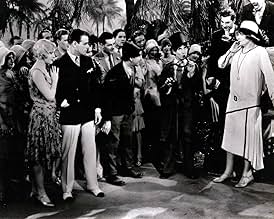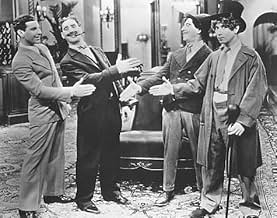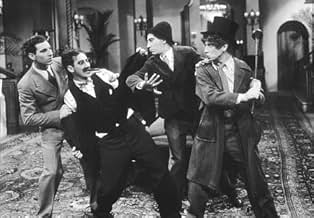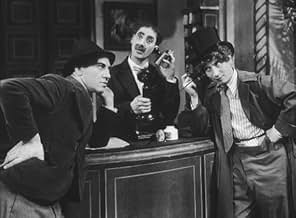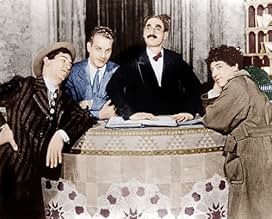PUNTUACIÓN EN IMDb
6,8/10
8,6 mil
TU PUNTUACIÓN
Groucho es el director del hotel "Los Cuatro Cocos" que atraviesa dificultades. Debido a una quiebra, se procede a la subasta del hotel por parcelas, pero la cosa se complica con la llegada ... Leer todoGroucho es el director del hotel "Los Cuatro Cocos" que atraviesa dificultades. Debido a una quiebra, se procede a la subasta del hotel por parcelas, pero la cosa se complica con la llegada de Chico y Harpo, y el robo de un valioso collar.Groucho es el director del hotel "Los Cuatro Cocos" que atraviesa dificultades. Debido a una quiebra, se procede a la subasta del hotel por parcelas, pero la cosa se complica con la llegada de Chico y Harpo, y el robo de un valioso collar.
- Dirección
- Guión
- Reparto principal
- Premios
- 2 nominaciones en total
Groucho Marx
- Hammer
- (as Marx Brothers)
Harpo Marx
- Harpo
- (as Marx brothers)
Chico Marx
- Chico
- (as Marx Brothers)
Zeppo Marx
- Jamison
- (as Marx Brothers)
Gamby-Hale Ballet Girls
- Dancers
- (as Gamby-Hale Girls)
Dolores Hope
- Dancer
- (sin acreditar)
Sylvan Lee
- Bell Captain
- (sin acreditar)
Barton MacLane
- Lifeguard
- (sin acreditar)
Reseñas destacadas
"The Cocoanuts" is the very first film the Marx Brothers did and is essentially a filmed recording of their Broadway triumph. Talkies were still in their infancy, and the technical aspects of this flick prove it! The camera can barely keep up with the boys as they leap around. But don't let the staginess and crummy musical interludes and subplots distract you... this film has some of the great moments in Marx comedy. Chico is especially aggressive with his lines (he just annoys the hell out of Groucho, foiling his plan to rig an auction with his denseness) and Harpo (with his original red wig, which films dark brown) has never been better, destroying the hotel lobby by eating buttons off bellboy's uniforms and swilling ink. Groucho has some of his most potent insults. Zeppo, surprisingly, has even less to do here than in subsequent outings. This film is hilarious and head-and-shoulders above their later MGM films like "Go West" and "At the Circus." Funny, funny, funny!
A brilliant film debut by the Marx Brothers in this 1929 musical comedy (from Broadway) about land speculation in Florida, jewel thieves, and well the Marx Brothers. In their first film, all the familiar schtick and word play are already in place with Groucho, Chico, and Harpo all excellent.
As usual there is also a romantic young couple--Mary Eaton and Oscar Shaw--and bad guys--Kay Francis and Cyril Ring. Also making her film debut at age 40 is the wonderful and imperious Margaret Dumont. Basil Ruysdael plays the house detective. Zeppo Marx plays the desk clerk.
A blah ballad is sung to death, but The Monkey Doodle-Doo song is terrific and well sung and danced by Eaton (a Broadway star) and chorus. Oddly staged productions number with chorus in monkey suits and tourists milling about in the background. But Eaton is quite good, considering the early sound equipment. And she has great legs.
Francis is fun in her second film (she made five in 1929) but teamed with the unappealing Ring. Shaw is OK but seems too old to be playing the juvenile lead.
But while Dumont, Francis, and Eaton are fun, it's the 3 brothers who dominate the film. Several classic bits, including the viaduct gag, Chico's great piano solo, Harpo getting to steal a few scenes, and of course Groucho riding roughshod over everyone. What a treat! While Kay Francis went on to major stardom in the 30s, Mary Eaton made one disastrous film after this hit, Flo Ziegfeld's Glorifying the American Girl. That ended her starring career in Hollywood.
The more I watch the Marx Brothers the more I appreciate Chico, who was always my least favorite of the 3. Now I notice his perfect comic timing and I just love his piano solos.
As usual there is also a romantic young couple--Mary Eaton and Oscar Shaw--and bad guys--Kay Francis and Cyril Ring. Also making her film debut at age 40 is the wonderful and imperious Margaret Dumont. Basil Ruysdael plays the house detective. Zeppo Marx plays the desk clerk.
A blah ballad is sung to death, but The Monkey Doodle-Doo song is terrific and well sung and danced by Eaton (a Broadway star) and chorus. Oddly staged productions number with chorus in monkey suits and tourists milling about in the background. But Eaton is quite good, considering the early sound equipment. And she has great legs.
Francis is fun in her second film (she made five in 1929) but teamed with the unappealing Ring. Shaw is OK but seems too old to be playing the juvenile lead.
But while Dumont, Francis, and Eaton are fun, it's the 3 brothers who dominate the film. Several classic bits, including the viaduct gag, Chico's great piano solo, Harpo getting to steal a few scenes, and of course Groucho riding roughshod over everyone. What a treat! While Kay Francis went on to major stardom in the 30s, Mary Eaton made one disastrous film after this hit, Flo Ziegfeld's Glorifying the American Girl. That ended her starring career in Hollywood.
The more I watch the Marx Brothers the more I appreciate Chico, who was always my least favorite of the 3. Now I notice his perfect comic timing and I just love his piano solos.
It's been suggested by more than one intelligent film critic that the Golden Age of movie comedies ended with the arrival of sound. Probably the earliest definitive refutation of that is this 1929 film introducing motion-picture audiences to the Marx Brothers.
The great Florida land boom has yet to hit the swampy resort town of Coconut Beach, where hotel owner Mr. Hammer (Groucho) and his assistant (Zeppo) deal with a paucity of paying guests and a platoon of bellhops who haven't been paid in weeks. Hammer manages to placate them ("You wanna be wage slaves? And what makes wage slaves? Wages!") but finds two new arrivals (Chico and Harpo) less easy to sucker while he tries to marry into the wealthy arms of the widow Mrs. Potter (Margaret Dumont).
It may be the Marxes' least revered film from their Zeppo period, but this, the earliest surviving comedy of theirs, provides more than quaint curio appeal or historic interest. It's a nice transfer of their stage act, using one of their successful Broadway plays with nifty direction by Robert Florey and Joseph Santley. While hobbled by early sound technology, there are plenty of neat camera tricks and a less static composition than on offer in the next, more heralded, Marx Brothers film, "Animal Crackers," with overhead shots and cutaways. And the antic wordplay, especially from Groucho, is so fast and dense it provides fresh laughs even after five or six screenings.
I even like the singing and dancing, especially an opening number, shot on a soundstage in Queens, N.Y. but dressed to resemble either Florida or a Haircut 100 video. The "let-us-entertain-you" spirit on ample evidence here evokes a fast-fading pre-Depression giddiness where flappers with wide hips and small chests bat eyes at derby-wearing men glad for the attention.
The Brothers themselves don't really need the help, their craft honed to perfection on stage that they clearly know where the laughs are. Groucho and Chico perform one of their classic routines, the "Viaduct/Why A Duck" number, while Harpo does some prime gurning and props his knee upon every passing dame (and some guys).
Groucho takes a look at Chico and Harpo's lone suitcase when they check in.
"That bag's empty!"
"We fill it up before we leave," answers Chico.
The most glaring weakness of "Cocoanuts" is a lamer-than-usual romantic subplot. Allan Jones and Kitty Carlisle slowed things down in "Night At The Opera," but at least they could sing, unlike Mary Eaton and Oscar Shaw, whose caterwauling here may attract dogs to your doorstep from a mile away. Irving Berlin's score is amazing for its inanity. Though "Monkey-Doodle-Doo" isn't quite as bad as its title, it sounds like "Blue Skies" compared to "When My Dreams Come True" a lifeless ballad reprised five (!) times in the picture, including twice by Harpo (once each on oboe and harp).
Dumont is not yet the presence she became in later Marx films, but Kay Francis offers an attractive foil to the Boys as a designing woman who bites off more than she can chew trying to make a stooge of Harpo. Audiences may start off thinking Basil Ruysdael is just another straight man playing a suspicious cop, but the joke's on us, as we discover by the end.
Speaking of straight men, this may be Zeppo's finest film, if you go along with those who argue he was the master of minimalist comedy, serving up subtle metahumor in the face of his brothers' hi-jinks by literally doing nothing on screen. Not until "Night At The Opera," in which he set a new standard by not appearing at all, would Zeppo be quite this masterful again.
The great Florida land boom has yet to hit the swampy resort town of Coconut Beach, where hotel owner Mr. Hammer (Groucho) and his assistant (Zeppo) deal with a paucity of paying guests and a platoon of bellhops who haven't been paid in weeks. Hammer manages to placate them ("You wanna be wage slaves? And what makes wage slaves? Wages!") but finds two new arrivals (Chico and Harpo) less easy to sucker while he tries to marry into the wealthy arms of the widow Mrs. Potter (Margaret Dumont).
It may be the Marxes' least revered film from their Zeppo period, but this, the earliest surviving comedy of theirs, provides more than quaint curio appeal or historic interest. It's a nice transfer of their stage act, using one of their successful Broadway plays with nifty direction by Robert Florey and Joseph Santley. While hobbled by early sound technology, there are plenty of neat camera tricks and a less static composition than on offer in the next, more heralded, Marx Brothers film, "Animal Crackers," with overhead shots and cutaways. And the antic wordplay, especially from Groucho, is so fast and dense it provides fresh laughs even after five or six screenings.
I even like the singing and dancing, especially an opening number, shot on a soundstage in Queens, N.Y. but dressed to resemble either Florida or a Haircut 100 video. The "let-us-entertain-you" spirit on ample evidence here evokes a fast-fading pre-Depression giddiness where flappers with wide hips and small chests bat eyes at derby-wearing men glad for the attention.
The Brothers themselves don't really need the help, their craft honed to perfection on stage that they clearly know where the laughs are. Groucho and Chico perform one of their classic routines, the "Viaduct/Why A Duck" number, while Harpo does some prime gurning and props his knee upon every passing dame (and some guys).
Groucho takes a look at Chico and Harpo's lone suitcase when they check in.
"That bag's empty!"
"We fill it up before we leave," answers Chico.
The most glaring weakness of "Cocoanuts" is a lamer-than-usual romantic subplot. Allan Jones and Kitty Carlisle slowed things down in "Night At The Opera," but at least they could sing, unlike Mary Eaton and Oscar Shaw, whose caterwauling here may attract dogs to your doorstep from a mile away. Irving Berlin's score is amazing for its inanity. Though "Monkey-Doodle-Doo" isn't quite as bad as its title, it sounds like "Blue Skies" compared to "When My Dreams Come True" a lifeless ballad reprised five (!) times in the picture, including twice by Harpo (once each on oboe and harp).
Dumont is not yet the presence she became in later Marx films, but Kay Francis offers an attractive foil to the Boys as a designing woman who bites off more than she can chew trying to make a stooge of Harpo. Audiences may start off thinking Basil Ruysdael is just another straight man playing a suspicious cop, but the joke's on us, as we discover by the end.
Speaking of straight men, this may be Zeppo's finest film, if you go along with those who argue he was the master of minimalist comedy, serving up subtle metahumor in the face of his brothers' hi-jinks by literally doing nothing on screen. Not until "Night At The Opera," in which he set a new standard by not appearing at all, would Zeppo be quite this masterful again.
The Marx Brothers first motion picture and Paramount's first "all talking, all singing, all dancing" musical will delight fans of the Marx Brothers, musicals and early cinema alike. While dated and somewhat stagey, after all it *was* basically a filmed version of their hit Broadway show, it holds up better than many films of its day. Kaufman and Ryskind, who also wrote the stage show, wrote the screenplay with an eye to making the Marx Brothers wit appear spontaneous and natural. I remember how shocked I was when I first realized the boys were using a script!
The movie is laced with classics of Marxian comedy. The famous "Why a duck?" scene with Groucho and Chico (remember - it's pronounced Chick-o, not Cheek-o, because he was such a womanizer), Groucho answering the telephone at the hotel's front desk (Ice water? Ice water? Peel some onions. That'll make your eyes water.) and Harpo shaking hands with the house detective while all of the hotel silverware falls out of his coat pockets.
Margaret Dumont is priceless as the clueless matron. She claimed in later years it wasn't an act; she really had no idea what the brothers were doing. Regardless, she is the ideal foil for the boys as they tear into "polite" society.
Take a look at The Cocoanuts. You'll see the wellspring from which all that Marx madness flows.
Jon Brian Waugh
The movie is laced with classics of Marxian comedy. The famous "Why a duck?" scene with Groucho and Chico (remember - it's pronounced Chick-o, not Cheek-o, because he was such a womanizer), Groucho answering the telephone at the hotel's front desk (Ice water? Ice water? Peel some onions. That'll make your eyes water.) and Harpo shaking hands with the house detective while all of the hotel silverware falls out of his coat pockets.
Margaret Dumont is priceless as the clueless matron. She claimed in later years it wasn't an act; she really had no idea what the brothers were doing. Regardless, she is the ideal foil for the boys as they tear into "polite" society.
Take a look at The Cocoanuts. You'll see the wellspring from which all that Marx madness flows.
Jon Brian Waugh
I've been told it's the first musical comedy to have been made. God only knows what that makes The Jazz Singer then - heavyweight drama, I suppose.
The first problem you're going to have if you want to see it is actually seeing it. The film has been very hard to find on DVD. A copy is now available on the recently released version of the UK box set of their early films but as yet has not been released on it's own. I believe this situation varies elsewhere in the world.
The second problem you'll have if you want to see it is actually seeing it. Beware cheap copies from distant lands. The film has fallen into disrepair due to neglect. This has meant that some copies of the film are almost totally unwatchable. I remember being given a copy of the film that was released in Australia where parts of the picture had been almost completely washed away while the soundtrack could barely be heard of the crackles of the tape.
Still, if you do find a good copy it is well worth watching. The filming is very static and the acting wooden in comparison to their later movies. However, given that this was their first release and based upon their second successful Broadway run, I think that can be forgiven.
The characters are already clearly drawn out and some of the sketches are as funny as anything they did later on in their career. The 'Why a Duck' sketch can rate along side the 'tootsie-frootsie' sketch as one of the best sketches between Groucho and Chico.
The music is forgettable, the plot wafer thin, but you'll laugh out loud more than the majority of the films you'll ever see.
The first problem you're going to have if you want to see it is actually seeing it. The film has been very hard to find on DVD. A copy is now available on the recently released version of the UK box set of their early films but as yet has not been released on it's own. I believe this situation varies elsewhere in the world.
The second problem you'll have if you want to see it is actually seeing it. Beware cheap copies from distant lands. The film has fallen into disrepair due to neglect. This has meant that some copies of the film are almost totally unwatchable. I remember being given a copy of the film that was released in Australia where parts of the picture had been almost completely washed away while the soundtrack could barely be heard of the crackles of the tape.
Still, if you do find a good copy it is well worth watching. The filming is very static and the acting wooden in comparison to their later movies. However, given that this was their first release and based upon their second successful Broadway run, I think that can be forgiven.
The characters are already clearly drawn out and some of the sketches are as funny as anything they did later on in their career. The 'Why a Duck' sketch can rate along side the 'tootsie-frootsie' sketch as one of the best sketches between Groucho and Chico.
The music is forgettable, the plot wafer thin, but you'll laugh out loud more than the majority of the films you'll ever see.
¿Sabías que...?
- CuriosidadesDuring the "Why a duck?" sequence, it seems that Groucho Marx almost calls Chico Marx "Ravelli", which is Chico's character in Animal Crackers. Since they were shooting The Cocoanuts in the morning and acting in Animal Crackers at night, this mix up is understandable.
- PifiasIn the opening scene, Hammer sends Jamison to meet a 4:15 train. When Jamison gets back, he refers to it as a 4:30 train.
- Créditos adicionalesThe opening credits are run against a background of negative film of the "Monkey-Doodle-Doo" number.
- Versiones alternativasDeleted Scenes:
- When the bellboys are protesting against being unpaid, Zeppo tells them that Groucho has yet to arise at four in the afternoon. His comforting postscript, that Groucho always gets up on Wednesday, precedes his arrival. This scene was shot, but later cut after the preview, leaving Groucho descending down the stairs, still putting on his coat, allowing time to ward off his staff to catch a 4:15 train.
- Another item that was cut from the preview version of the film was a love ballad sung by Groucho to Margaret Dumont entitled "A Little Bungalow". Originally sung in the play by the romantic leads Polly Potter and Robert Adams, the song slowed up the picture.
- ConexionesFeatured in 46th Annual Academy Awards (1974)
- Banda sonoraFLORIDA BY THE SEA
(1925) (uncredited)
Written by Irving Berlin
Sung off-screen by chorus
Danced by Gamby-Hale Ballet Girls and Allan K. Foster Girls
Selecciones populares
Inicia sesión para calificar y añadir a tu lista para recibir recomendaciones personalizadas
- How long is The Cocoanuts?Con tecnología de Alexa
Detalles
- Fecha de lanzamiento
- País de origen
- Idioma
- Títulos en diferentes países
- Los cocos
- Localizaciones del rodaje
- Kaufman Astoria Studios - 3412 36th Street, Astoria, Queens, Nueva York, Nueva York, Estados Unidos(Paramount Astoria Studios site)
- Empresa productora
- Ver más compañías en los créditos en IMDbPro
Taquilla
- Presupuesto
- 500.000 US$ (estimación)
- Recaudación en todo el mundo
- 57 US$
- Duración1 hora 36 minutos
- Color
Contribuir a esta página
Sugerir un cambio o añadir el contenido que falta

Principal laguna de datos
By what name was Los cuatro cocos (1929) officially released in India in English?
Responde

